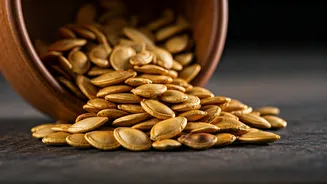Heart Health Champion
Pumpkin seeds are packed with nutrients that are fantastic for your heart. They're a great source of magnesium, which helps regulate blood pressure. High
blood pressure is a major risk factor for heart disease. Furthermore, the seeds contain antioxidants that combat free radicals, protecting your heart from damage. Consuming pumpkin seeds can also help lower your LDL (bad) cholesterol levels. The healthy fats present in pumpkin seeds are beneficial for your heart and reduce the risk of heart-related ailments. Adding a handful of these seeds to your diet can provide a boost to your heart health. They can easily be included in meals or enjoyed as a quick snack. So, making pumpkin seeds a part of your diet becomes an easy and delicious way to prioritize your cardiovascular wellness, contributing to a healthier and more robust heart.
Better Sleep Quality
Pumpkin seeds can improve sleep quality. They are a natural source of tryptophan, an amino acid that the body uses to produce serotonin, which then converts into melatonin, a hormone that regulates sleep. Including pumpkin seeds in your diet could help you fall asleep faster and sleep more soundly throughout the night. It is important to remember that improving sleep doesn't only depend on what you eat. Other lifestyle factors like a consistent sleep schedule and a relaxing bedtime routine are equally important. Nevertheless, pumpkin seeds provide a valuable dietary contribution to promoting better sleep. Regularly consuming pumpkin seeds can significantly reduce the time taken to fall asleep and enhance the overall quality of sleep, supporting a more restful and revitalizing experience.
Rich Nutritional Powerhouse
Pumpkin seeds are a nutritional powerhouse, offering a wide array of vitamins, minerals, and healthy fats. They are an excellent source of zinc, which supports immune function and promotes wound healing. Besides zinc, pumpkin seeds are rich in magnesium, contributing to numerous bodily functions like blood sugar control and bone health. They are also packed with antioxidants, which help protect cells from damage. Moreover, pumpkin seeds provide essential fatty acids that are vital for brain health and overall well-being. The seeds’ nutritional density makes them a valuable addition to any balanced diet. Incorporating pumpkin seeds is a simple way to boost your daily nutrient intake and support overall health.
Manage Blood Sugar
Pumpkin seeds can help manage blood sugar levels. They have a good amount of fiber and are rich in magnesium, both of which are beneficial for blood sugar control. Fiber slows down the absorption of sugar into the bloodstream, preventing rapid spikes after meals. Magnesium helps improve insulin sensitivity, enabling the body to use insulin more effectively. For individuals with diabetes, or those at risk, incorporating pumpkin seeds into their diet can be a valuable strategy. It supports a balanced blood sugar level, therefore reducing the risk of complications associated with the disease. Consuming pumpkin seeds can be a supportive measure alongside other essential lifestyle modifications. It can effectively contribute to better blood sugar management and general health.
Easy to Enjoy
Pumpkin seeds are incredibly versatile and easy to include in your diet. They can be eaten raw, roasted, or added to a wide range of dishes. Roasting pumpkin seeds enhances their flavor, making them a delicious snack. You can sprinkle them on salads, add them to your morning cereal or oatmeal, or incorporate them into baked goods like muffins and bread. They also blend well into smoothies. With their mild, nutty taste and crunchy texture, pumpkin seeds provide an enjoyable way to boost your daily nutrition. Making pumpkin seeds a regular part of your meals is an uncomplicated yet effective way to experience their many health benefits. They can seamlessly blend into many recipes, making it easier to enjoy their advantages.



















